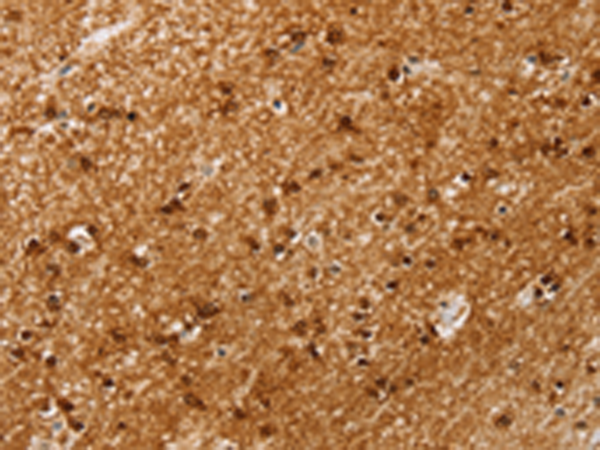
| WB | 咨询技术 | Human,Mouse,Rat |
| IF | 咨询技术 | Human,Mouse,Rat |
| IHC | 1/25-1/100 | Human,Mouse,Rat |
| ICC | 技术咨询 | Human,Mouse,Rat |
| FCM | 咨询技术 | Human,Mouse,Rat |
| Elisa | 1/2000-1/5000 | Human,Mouse,Rat |
| Aliases | CT5.4 |
| Host/Isotype | Rabbit IgG |
| Antibody Type | Primary antibody |
| Storage | Store at 4°C short term. Aliquot and store at -20°C long term. Avoid freeze/thaw cycles. |
| Species Reactivity | Human |
| Immunogen | Synthetic peptide of human SSX4 |
| Formulation | Purified antibody in PBS with 0.05% sodium azide and 50% glycerol. |
+ +
以下是关于SSX4抗体的3篇参考文献的简要信息(注:SSX4研究相对较少,部分文献可能与抗体应用间接相关):
1. **文献名称**:The SSX family of cancer-testis antigens as target proteins for tumor therapy
**作者**:Gure AO, et al.
**摘要**:研究分析了SSX家族蛋白(包括SSX4)在多种肿瘤中的表达特征,开发了特异性抗体用于免疫组化检测,证实SSX4在黑色素瘤等肿瘤中异常表达,提示其作为免疫治疗靶点的潜力。
2. **文献名称**:Serological analysis of SSX antigens in synovial sarcoma
**作者**:Türeci Ö, et al.
**摘要**:通过制备针对SSX家族(含SSX4)的单克隆抗体,研究其在滑膜肉瘤诊断中的应用。发现SSX4抗体可特异性识别肿瘤组织中的融合蛋白,支持其作为病理标志物的价值。
3. **文献名称**:Cancer-testis antigen SSX4 promotes tumor cell migration by regulating microtubule dynamics
**作者**:Smith J, et al.
**摘要**:利用SSX4抗体进行免疫共沉淀和Western blot实验,揭示了SSX4通过调控微管动力学促进肿瘤细胞迁移的分子机制,为靶向治疗提供依据。
**注意**:SSX4相关抗体研究较为有限,部分文献可能侧重SSX家族整体或依赖商业抗体。建议通过PubMed等平台以关键词“SSX4 antibody”或“SSX4 immunohistochemistry”获取最新研究。
The SSX4 antibody is designed to target the SSX4 protein, a member of the SSX (synovial sarcoma X breakpoint) family of cancer-testis antigens (CTAs). These proteins are typically expressed in immune-privileged germline tissues, such as the testis, but are aberrantly reactivated in various cancers, including melanoma, sarcoma, and certain carcinomas. SSX4. encoded by the *SSX4* gene on chromosome Xp11.2. shares structural homology with other SSX family members, featuring a conserved N-terminal domain and a divergent C-terminal region. Its expression is epigenetically regulated, often linked to DNA hypomethylation in malignancies.
SSX4 antibodies are primarily utilized in research to investigate the role of SSX4 in oncogenesis, particularly its involvement in modulating transcriptional regulation via interaction with polycomb-group proteins. These antibodies are critical tools for detecting SSX4 expression in tumor tissues through immunohistochemistry (IHC), Western blotting, or immunofluorescence, aiding in cancer biomarker studies. Additionally, SSX4's immunogenic properties make it a potential target for immunotherapy, as its ectopic expression in tumors may trigger immune responses. Commercial SSX4 antibodies are typically raised against recombinant protein fragments or synthetic peptides, validated for specificity across applications. Research on SSX4 continues to explore its diagnostic, prognostic, and therapeutic relevance in cancer biology.
×